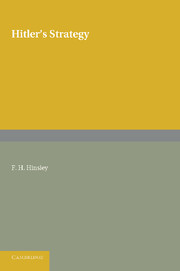Book contents
- Frontmatter
- Contents
- PREFACE
- Note on Sources and References
- CHAPTER I The German Navy, the Russian Pact, the British Problem and the Decision to Make War
- CHAPTER II The First Phase
- CHAPTER III The Invasion of Norway and the Fall of France
- CHAPTER IV An Invasion of England?
- CHAPTER V The Crucial Months, September to December 1940
- CHAPTER VI THE DECISION TO ATTACK RUSSIA
- CHAPTER VII North Africa, The Mediterranean and the Balkans in 1941
- CHAPTER VIII The Battle of the Atlantic in 1941
- CHAPTER IX German-Japanese Negotiations in 1941
- CHAPTER X 1942
- CHAPTER XI The End of the German Surface Fleet, January 1943
- CHAPTER XII Hitler's Strategy in Defeat
- APPENDIX A The German Surface Fleet
- APPENDIX B Germany's Infringements of the Naval Clauses of the Treaty of Versailles
- APPENDIX C The New U-Boats
- INDEX
CHAPTER VI - THE DECISION TO ATTACK RUSSIA
Published online by Cambridge University Press: 05 June 2016
- Frontmatter
- Contents
- PREFACE
- Note on Sources and References
- CHAPTER I The German Navy, the Russian Pact, the British Problem and the Decision to Make War
- CHAPTER II The First Phase
- CHAPTER III The Invasion of Norway and the Fall of France
- CHAPTER IV An Invasion of England?
- CHAPTER V The Crucial Months, September to December 1940
- CHAPTER VI THE DECISION TO ATTACK RUSSIA
- CHAPTER VII North Africa, The Mediterranean and the Balkans in 1941
- CHAPTER VIII The Battle of the Atlantic in 1941
- CHAPTER IX German-Japanese Negotiations in 1941
- CHAPTER X 1942
- CHAPTER XI The End of the German Surface Fleet, January 1943
- CHAPTER XII Hitler's Strategy in Defeat
- APPENDIX A The German Surface Fleet
- APPENDIX B Germany's Infringements of the Naval Clauses of the Treaty of Versailles
- APPENDIX C The New U-Boats
- INDEX
Summary
It was in July 1940, it is often said, that Hitler was first attracted by the possibility of an Eastern campaign. There is no doubt, according to one authority, that by the end of September 1940 he had finally made up his mind to launch the attack. When he turned on Russia, in the words of another account, he was ‘flushed with success and intoxicated by the propaganda which hailed him as the greatest strategic genius of all time’. None of these judgments survives a close examination of the evidence.
It is true that Hitler's interest in an early attack on Russia first emerges in the documents in July 1940. But the documents, both before the War and —despite the Russo-German Pact—from the day the War began, leave no doubt that what was born in July 1940 was not simply the idea of an attack on Russia, which had long been in his mind, but the feeling that an attack on Russia, in a war on two fronts, before Great Britain was defeated or placated, in circumstances which he had never yet contemplated, might have to be considered. ‘If it is not certain’, he said, on 21 July, ‘that preparations (for ‘Sea Lion’) can be completed by the beginning of September, other plans will have to be considered’; and his other remark on this occasion—‘naturally it is our duty to deliberate the Russian and American questions carefully’— sufficiently indicated the direction his thoughts would take if ‘Sea Lion’ proved impracticable.
To this extent the abandonment of ‘Sea Lion’ in the second half of September was clearly a major turning-point in Hitler's attitude towards the Russian undertaking. But there is a wealth of difference between this fact and the claim that his mind was quite made up by the end of September, as soon as ‘Sea Lion’ was abandoned. The decision to attack Russia was not reached as soon as ‘Sea Lion’ was postponed; and to claim that it was is to ignore the evidence or at least to read it in the light of later events.
- Type
- Chapter
- Information
- Hitler's Strategy , pp. 124 - 142Publisher: Cambridge University PressPrint publication year: 2013



